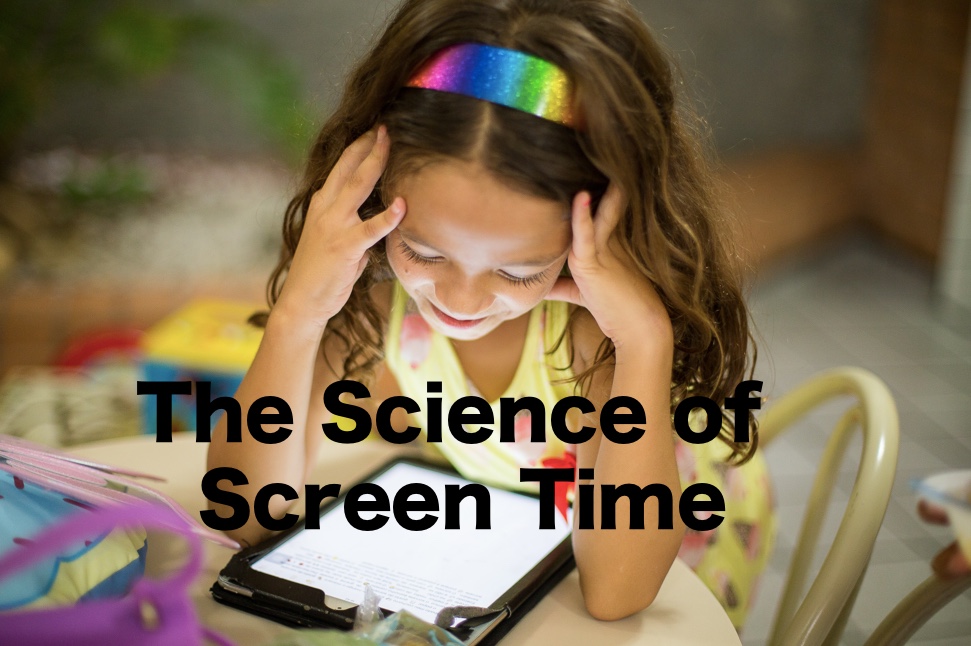The Science of Screen Time
The subject of screen time is a hot debate right now among parents and scientists alike. Screens, including smart phones, tablets, computers, and televisions, are becoming more and more ingrained into everyday life, which begs the question:
What are the effects of all these screens on children’s development?
On one hand, we know intuitively that gluing children to screens for 8 hours a day can’t be good for their health and development, just like it would be unhealthy for adults to sit and watch TV for 8 hours a day! Time spent playing on an iPad or watching YouTube videos is time that could be spent reading, exercising, or playing with other kids or adults. On the other hand, it would be silly for parents to block their children’s access to all screens. In a world with increasing opportunities to use technology to improve our lives, we can agree that having at least some exposure to screens will help children to integrate into the world around them.
So, how much screen time is enough, and how much is too much? Honestly, screens have grown so prevalent in such a short amount of time that it’s been tough for researchers to study the effects of screens on children’s development over many years. We really want to know if there are long-term negative effects of too much screen time, but screens have exploded into the marketplace so quickly that it’s been nearly impossible for researchers to do studies examining how screen time can affect children into adulthood.
However, there have been more and more short-term research studies coming out that have started to inform our ideas about best practices for screen time use in children. We’ll review some of the findings below along with guides for media use from pediatricians and researchers!
For Ages 0-2 years:
There so far appears to be very little benefit to screen time for children aged 0-2. At these very young ages, children need social interactions with caregivers and hands-on exploration in order to learn. Their brains are not developed enough to grasp what is happening on screens, so their learning is much better when they are able to interact with people and objects as opposed to watching screens. Starting at around 15 months, there is some evidence that children can start to learn from media if their caregiver watches with them and then reteaches them what they watched. Any screen time should be social and interactive!
Young children who use Skype or FaceTime with family or friends also need support from parents to understand what they are seeing if they are very young!
Overall, from ages 0-2 years, there is little benefit from screen use, especially without parent support. There are documented problems with cognitive, social, and emotional development for young children who spend too much time using screens. Children who use screens too much are also more likely to develop obesity.
For children older than 2 years:
Media limits are very appropriate for children older than 2 years and for teens! Children and teens should not use screens for more than 1 hour per day. Media-free times, such as at the dinner table, are recommended, too!
Children and teens who use screens more often are more likely to have weight problems, problems at school, have social, behavioral, and mental health problems, and interact with others less. Children and teens media use should be monitored by parents, especially because of the risk of cyberbullying, sexting, and loss of privacy. Parents should talk to teens about these risks to make sure they are safe online.
Parents should also talk to teens about the effects of advertising, especially since certain companies that market tobacco and alcohol have a strong online presence. A recent study reported that 95% (!!!) of apps for children 5 and younger have some type of advertisements in them! These ads can be so well-embedded into apps that children think they are part of the game. Parents should keep an eye out for these advertisements and talk to their children about the goals of advertising so that they will be more aware when they encounter these ads in the future.
There is evidence that in children with more social and emotional problems, parents are more likely to use screens to calm their children and to keep them quiet, especially if parents feel that they have little control. It is not known whether using screens to calm children causes more social and emotional problems or children with more social and emotional problems cause parents to use technology to calm them. Although screens may be an easier way to calm children, using other methods that help children to regulate their own emotions and soothe themselves may be better for children’s development in the long-run.
What does the American Academy of Pediatrics say?
Click here to access the family media tool that they reference in the video to set up a media plan for your family!
How are sleep and media use related?
One of the major issues with screen time is that it may interfere with sleep in at least 3 ways:
The artificial light from screens has been shown to change levels of hormones that help us regulate our sleep cycles. Especially right before bed, when our brains expect darkness, bright screens can be a signal to our brain that it is daytime, which can mess up our internal clocks that help us regulate sleep. This change can make it harder to fall asleep and have good sleep quality.
Another problem is that children may stay up too late on their screens and not get the recommended amount of sleep. We know that too little sleep is bad for learning, memory, and brain development! This is especially a risk for teens who may keep their phones with them in their bedroom at late and stay up too late texting friends, on social media, or playing games.
Finally, children may be really stimulated by what they are doing on their screens, which may make it harder for them to relax and get to sleep.
The following are recommendations for making sure tech is not interfering with a good night’s sleep:
• Make sleep a priority and figure out what healthy sleep expectations are for you and your children using the following guidelines from the National Sleep Foundation by clicking here.
• Create a bedtime routine that avoids electronic media use and includes calming activities such as reading or taking a bath.
• Remove all media from your child or teen’s bedroom, including TVs, computers, tablets, video games, and cell phones. Bedrooms should be a space for sleeping and not using media!
• Avoid bright light in the evening to help your body regulate its natural clock that tells you when to go to sleep.
• If your child or teen is showing mood or behavioral problems, consider whether they are getting enough sleep or if they are getting poor quality sleep!
PARENT MEDIA USE
Until this point we have focused on child and teen use of screen time. What are the recommendations for parents?
Parents who are on their phone more often when they are around their children have fewer interactions with their child and play less with their child, both of which are risk factors for poorer developmental outcomes. Children whose parents use screens more often tend to engage and explore less, which could lead to less learning. There is also some evidence that parents who use screens more when they are around their children have more conflict with their child, and they model their excessive use of media to their children. Changing parents’ media use may be an important way to change children’s problematic media use!
If you’re interested in learning more, check out this video of pediatrician Dr. Dimitri Christakis talking about his and others’ research on child media use:
If you have any questions or comments about screen time and parent and child media use, I’d love to hear them!
-Jena



